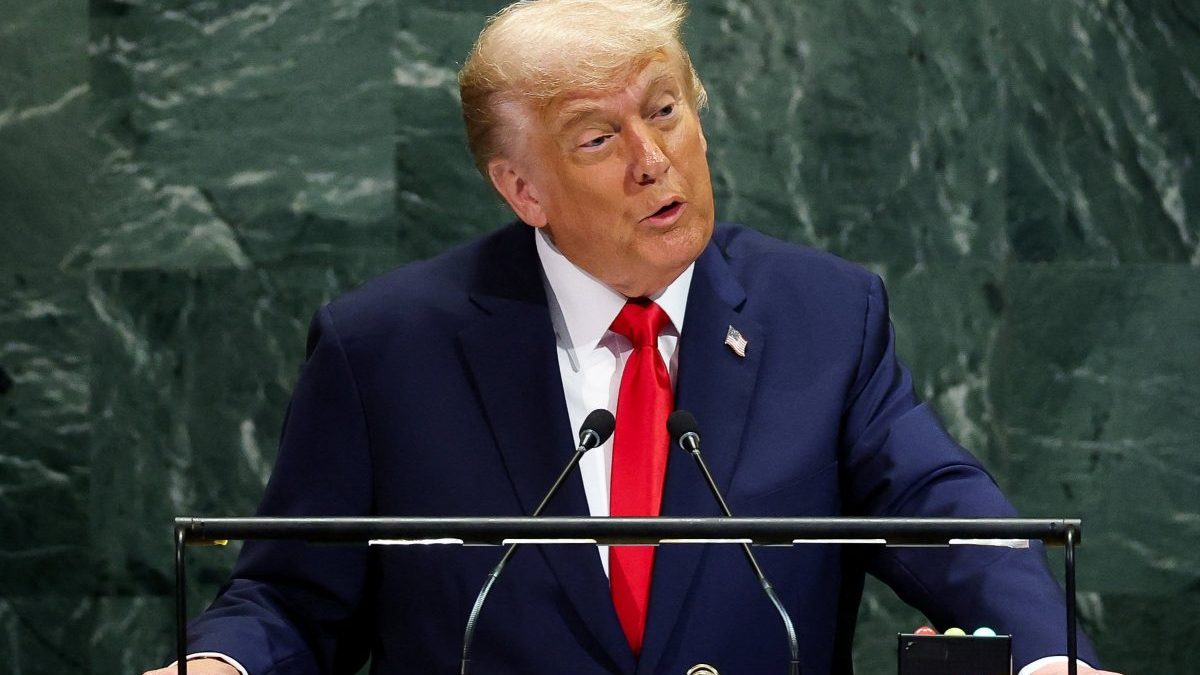
As world leaders convene in New York City for the annual gathering of the UN General Assembly, friction between the US and other members of the global organisation are palpable
As Donald Trump hailed “the golden age of America” at the UN General Assembly in New York on Tuesday, tensions between the US and United Nations were palpable.
The President highlighted “historic trade deals” with the UK and others, and claimed the US was respected “like it has never been respected before”.
There was scattered awkward laughter in the room as he jokingly complained about a broken escalator and teleprompter at the UN – and a lack of marble floors – but UN officials and experts have warned that Trump’s approach to the organisation could lead to a waning of US influence.
Since the start of the year, Trump has moved to slash US funding of the UN, withdrawn from many of its agencies, and ordered a review of America’s interactions with the organisation.
His actions have exacerbated the UN’s already significant budget crisis and created space for nations including China to expand their influence.
“US credibility and influence as a reliable partner and as a state broadly committed to human rights and international peace and security is suffering badly,” Phil Lynch, executive director of the non-profit International Service for Human Rights, told The i Paper.
“Trump on the international level has an agenda which very much mirrors his agenda at the domestic level, which is one of the suppression of dissent, the erosion of accountability mechanisms and the subversion of the rule of law.
“His agenda at the UN in terms of the withdrawal of funding and denunciation of treaties follows a very similar pattern.”
In his speech, Trump listed seven wars he claims to have ended during his second term – saying that the UN “did not even try to help” find a solution in any of them.
“It’s too bad that I had to do these things instead of the United Nations doing them,” Trump said. “That being the case, what is the purpose of the United Nations? The UN has such tremendous potential but it’s not even coming close to living up to that potential.
For the most part, all they seem to do is write a really strongly worded letter.. It’s empty words and empty words don’t solve war.”
Trump also noted the move by many UN members to recognise Palestine’s statehood, telling the UNGA: “As if to encourage conflict, some of this body seek to recognise a Palestinian state.”
He claimed this would be rewarding Hamas for these atrocities, “even as Hamas refuses to release the hostages or to accept a ceasefire.”
Lynch noted that the US withholding of funds has “substantially weakened the UN’s human rights pillar and has weakened its capacity to protect human rights, investigate violations and hold perpetrators to account”, adding that it “will erode human rights and diminish international peace and security”.
The US played a pivotal role in the creation of the UN 80 years ago, and has historically been its largest financial contributor, but is set to give just $300m this year compared to the roughly $800m expected contribution.
A cash-strapped UN is looking to avert the looming crisis with a reform plan called UN80 to streamline administrative services, cut back on thousands of mandates and reduce peacekeeping missions.
Trump’s stance may see the balance of power within the organisation pivot away from the US, Lynch says.
“The vast majority of states understand that their individual and collective interests are best served through multilateral cooperation and respect for the international rule of law, and that our collective future does not lie in a world of lawlessness, chaos and raw power of the type that Trump projects,” Lynch added.
The US withdrawal is creating an opportunity for other nations to step in and attempt to fill the vacuum. China is seeking to build alliances and co-opt institutions to promote its interests.
Experts warn that Trump’s actions may see power ceded to authoritarian nations. In direct response to his funding cuts, Qatar has offered to host some of the UN workers’ rights agency offices, while Russia has posited cutting speaking time for advocacy groups to save money.
“There are definitely geopolitical implications and implications for some of the values the UN has traditionally been the home for,” says Laura Chappell, associate director for international policy at the Institute for Public Policy think-tank.
“But if this moment is leading to devolved power from New York and Geneva to make the UN genuinely global in its footprint, that could be positive. But it’s important for the UN’s operational model to reflect its values and ensure cost-cutting and political convenience don’t lead to decisions that undermine those values.”
Some shifts are already being seen in this year’s Congress, Lynch says. On Monday, Chile and the Netherlands convened a roundtable to discuss the importance of human rights and multilateral cooperation – without the US.
“We see a more diverse group of states leading on the Human Rights Council, with a range of Latin American states, for example, stepping up to collectively ensure accountability for human rights violations in Venezuela and Nicaragua. And a diverse group of smaller states leading discussions on issues of climate change and environmental protection.”
Officials and delegates are questioning whether the US is the right place for the organisation to convene. Some have touted moving the UN to another country such as Switzerland, highlighting Trump’s veto of Palestinian Authority President Mahmoud Abbas to attend this year’s congress.
On Friday, delegates responded to his travel ban by voting 145 to five to allow Abbas to address the commission via video link, expected to take place at the end of the week.
“Now we’ve had two Trump administrations, I don’t think his behaviour will be viewed as a blip,” Chappell says.
“So we need to think, ‘What does a UN with a much less engaged America look like?”
